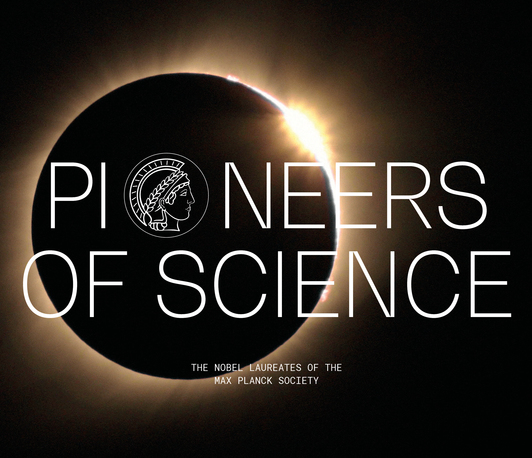Pioneers of Science │ The Nobel Laureates of the Max Planck Society
Exhibition & Digital Story
- Start: Sep 5, 2023
- End: Sep 25, 2023
- Location: Kulturpalast Dresden, Schloßstr. 2, 01067 Dresden
- Host: Max Planck Society
- Contact: jubilaeum@gv.mpg.de

The Nobel Prize in the natural sciences, presented annually in Stockholm, has been the most prestigious and renowned international research award for over a century. Among its recipients are 30 researchers of the Max Planck Society and its predecessor organization, the Kaiser Wilhelm Society. This distinction positions the Max Planck Society as one of the top three institutions worldwide in terms of Nobel Prize-winning researchers. These achievements represent significant milestones in research conducted within the Max Planck Society from 1915 to the present day, while also reflecting the broader advancements in science throughout the 20th and 21st centuries
"Pioneers of Science" presents this ground-breaking research through an online exhibition and a compact touring exhibition in the well-established format of the Science Pavilion. The touring exhibition will be showcased in six German cities from February 2023 to March 2024, commemorating the 75th anniversary of the Max Planck Society.
Research that shapes the world
Eight thematic stations vividly illustrate how Nobel Prize-winning research has transformed people's daily lives and shaped the modern world. These include Albert Einstein's theory of relativity, Paul Crutzen's pioneering work on the causes of the ozone layer depletion in the 1980s, and Karl Ziegler's ground-breaking process for polyethylene production in 1953, which served as a catalyst for the plastic age. Through a combination of contemporary and historical interviews, this project brings these exceptional individuals to life, prompting us to reflect on the social and political history of the past.

Adolf Butenandt's ground-breaking research in the 1930s, elucidating the nature of sex hormones, laid the foundation for the production of hormone preparations that now provide significant benefits to transsexual individuals - a development that the conservative Butenandt probably could not have imagined. The career and biography of Stefan Hell, the inventor of the STED microscope in the 1990s, illustrate how Nobel laureates must think unconventionally and approach physical principles with a fresh and unbiased perspective in order to gain new insights. Hell's revolutionary light microscope transcends the boundaries of traditional optics and allows unprecedented glimpses into the nanoworld of living cells.
Looking back at past Nobel Prize-winning research illuminates how it has significantly reshaped our understanding of space, the cosmos, matter, and the relationship between humans and nature. As for the current prize-winning research, only time will reveal whether it possesses a similar transformative potential. In certain cases, the far-reaching implications of these advancements are already evident today, giving rise to profound ethical questions. One prominent example is the CRISPR-Cas9 technique developed by Emmanuelle Charpentier, which allows for precise modifications of human DNA, including potentially in the germ line. The ethical considerations associated with this capability have sparked intense social debates regarding its permissibility.
The impact and utilization of scientific discoveries in our lives are influenced by political, social, and individual choices, not limited to the case mentioned above. The fact that advances in science and technology can provide humanity with power is dauntingly evident, particularly in light of a new nuclear threat. It is important to acknowledge that the development of nuclear weapons stemmed directly from Otto Hahn's discovery of nuclear fission in 1938. Hahn himself recognized the dual nature of his research findings. Consequently, as the inaugural president of the Max Planck Society, he vehemently advocated for the peaceful utilization of nuclear energy starting in 1948. He consistently urged politicians to renounce the creation of nuclear weapons, which possess the capability to annihilate our planet.
Exhibition available both on-site and online
The "Pioneers of Science" exhibition, available both on-site and online, guides visitors through eight stations, each focusing on different fields of research ranging from biochemistry and anthropology to astrophysics and chemistry, such as catalysis as a key technology for industry. The project aims to convey knowledge as well as highlight the creative aspects of the Nobel Prize-winning work. Additionally, it encourages discussions surrounding the significance of science in various domains such as industry, medicine, ecology, and everyday life, shedding light on how the evaluation of scientific discoveries has evolved over time.

Designed as a hybrid project, "Pioneers of Science" offers two distinct formats. The exhibition, following the proven Science Pavilion format, will be showcased in six German cities from February 2023 until March 2024. The exhibition features a range of special highlights, including selected exhibits and over 20 reproductions of Nobel Prize certificates. Notable among them is Klaus von Klitzing's laboratory diary, which provides insight into his discovery of a new natural constant. Visitors will have the opportunity to engage with the Explainer team, participate in guided tours, and explore the accompanying program featuring lectures, guided tours, and even a pub quiz—all very “noble” activities, fitting for the 75th anniversary of the Max Planck Society!
The Digital Story component of the project provides an immersive experience, presenting a multimedia narrative that incorporates films, photos, graphics, cartoons, explanations, and animations and allowing users to explore them at their own pace. Additionally, the Digital Story includes numerous links that encourage further exploration into the realm of science, making it an excellent resource for schools, as it provides valuable starting points for further learning.
Digital Story
Exhibition
Kulturpalast Dresden
Schloßstr. 2, 01067 Dresden
FREE ENTRY
Monday–Saturday | 10 a.m.–7 p.m.
Guided tour through the exhibition for individual visitors
Dates: Monday–Saturday | 3 p.m
Duration: approx. 20 min
Group size: maximum of 12 people per tour
Guided tours are free of charge.
Further stations
05.10.2023 - 19.11.2023 | Museum of the University of Tübingen (MUT) in Hohentübingen Palace, Tübingen
01.12.2023 - 14.01.2024 | Henry Ford Building, Free University Berlin
(Anticipated) 24.01.2024 - 05.03.2024 | State and University Library, Hamburg

